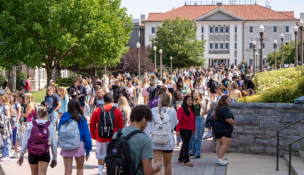Virginia’s universities at risk if checks and balances fail
Supreme Court of Virginia faces constitutional test

George Mason University

George Mason University
Virginia’s universities at risk if checks and balances fail
Supreme Court of Virginia faces constitutional test
SUMMARY:
- George Mason University professor emeritus writes that state Supreme Court case will determine constitutional balance of power
- Governors appoint university boards, but the General Assembly must confirm members
- Nullifying Senate votes would harm the legislature and the citizens it serves, James Finkelstein writes
The Virginia Supreme Court will soon decide a case that goes to the heart of how we govern our public universities. The issue is whether the governor’s appointees to the boards of visitors at the University of Virginia, Virginia Military Institute and George Mason University can continue serving despite the Senate Privileges and Elections Committee’s vote not to confirm them.
This is more than just a legal dispute over legislative process; it is a test of whether Virginia will maintain the constitutional balance of power that has guided the commonwealth for generations — or allow the executive branch to override the General Assembly and threaten the principle of checks and balances.
Virginia law clearly outlines the relationship between boards of visitors and the General Assembly. Virginia Code states that all appointments to governing boards are “subject to confirmation by the General Assembly.” For George Mason University, Virginia Code goes further, stating that the board “shall at all times be under the control of the General Assembly.”
Boards are therefore not responsible to the governor, but to the General Assembly on behalf of Virginia’s citizens. The confirmation process guarantees this accountability.
The Senate followed its rules. A resolution to confirm the appointees was introduced, referred to the Privileges and Elections Committee, and voted down. According to standard legislative practice — where many bills and resolutions “die in committee” — that was a rejection of confirmation. To argue otherwise is to say Senate votes do not matter.
Instead of respecting the Senate’s decision, the rectors of the three universities — supported by the Virginia attorney general — have asked the state Supreme Court to lift the circuit court’s injunction and allow the appointees to keep serving. Basically, they are asking the court to disregard the Senate’s vote.
That action is extraordinary and concerning. The rectors’ and visitors’ responsibilities are to their institutions, and by law, they only hold office when confirmed by the General Assembly. They are meant to protect university independence, not act as representatives of the governor. By going to court to bypass the Senate, they politicize governance and weaken the trust of students, faculty and the public.
Boards of visitors are not just ceremonial bodies. They manage multibillion-dollar budgets, determine tuition rates, approve major construction projects and appoint university presidents. Their decisions influence the lives of tens of thousands of Virginians.
Allowing boards unchecked power through executive appointments — without substantial legislative oversight — undermines accountability. The General Assembly’s role in confirmation is not a formality; it is a vital check against one-branch dominance, ensuring that universities serve the public interest rather than political agendas.
Virginia has long taken pride in its balanced approach. The governor appoints, but the General Assembly confirms. That partnership ensures that no single branch dominates and that universities remain connected to the commonwealth as a whole, rather than to the preferences of one officeholder.
The circuit court recognized what should be obvious: nullifying legislators’ votes causes irreparable harm. When senators voted against confirmation, they exercised a constitutional prerogative. Allowing the appointees to continue serving despite that vote renders it meaningless. You cannot “un-nullify” a vote.
This is not just an injury to a few senators; it harms the General Assembly as an institution and, by extension, the citizens it serves. The constitution does not permit gubernatorial appointees to serve indefinitely while their confirmation is delayed or denied.
The question facing the Supreme Court is clear: does the Senate’s vote have constitutional authority? If it doesn’t, Virginia’s balance of power dangerously favors the executive, risking political meddling in universities. If it does, checks and balances stay in place, and boards of visitors continue to be accountable to the General Assembly — as mandated by law.
The choice should be straightforward. To safeguard Virginia’s universities — and the constitutional order that has long shielded them — the Supreme Court must uphold the Senate’s authority. The future of higher education and the strength of Virginia’s democracy rely on this.
James Finkelstein is Professor Emeritus of Public Policy at George Mason University.

















